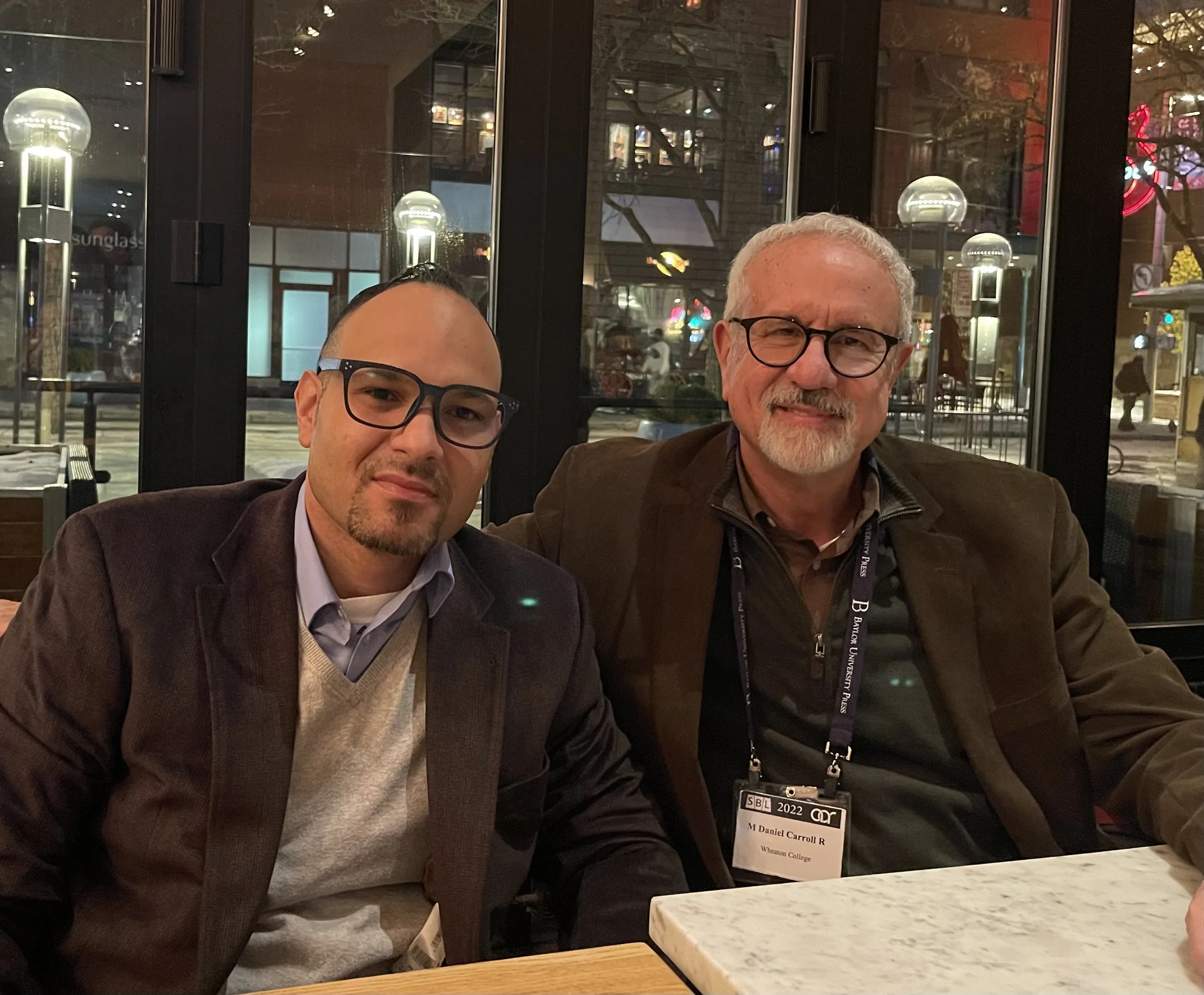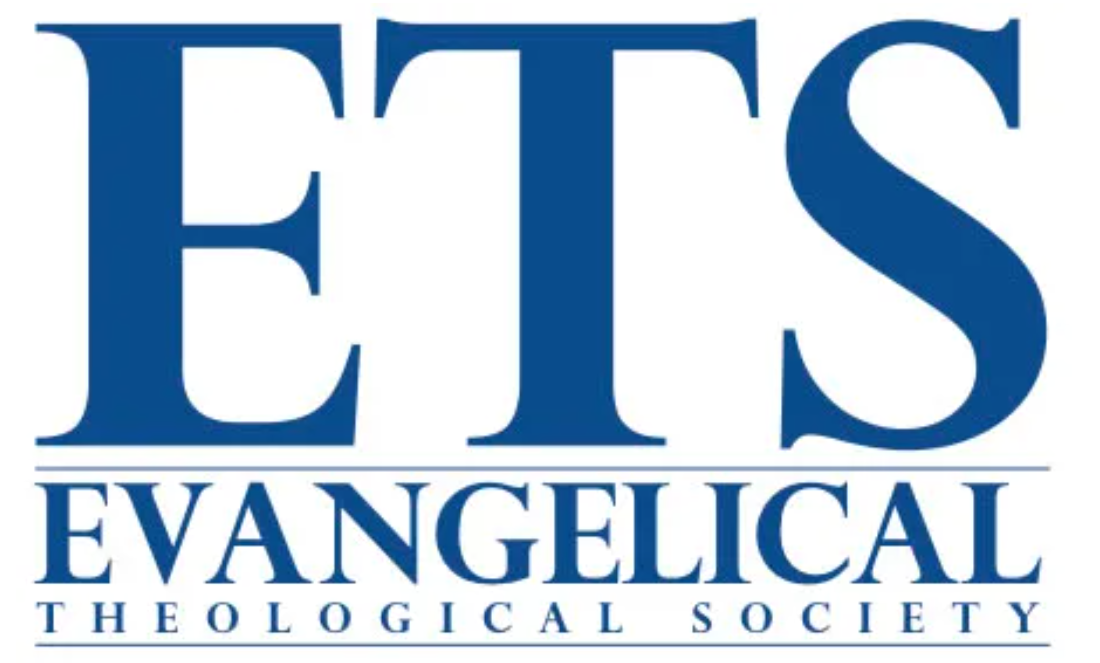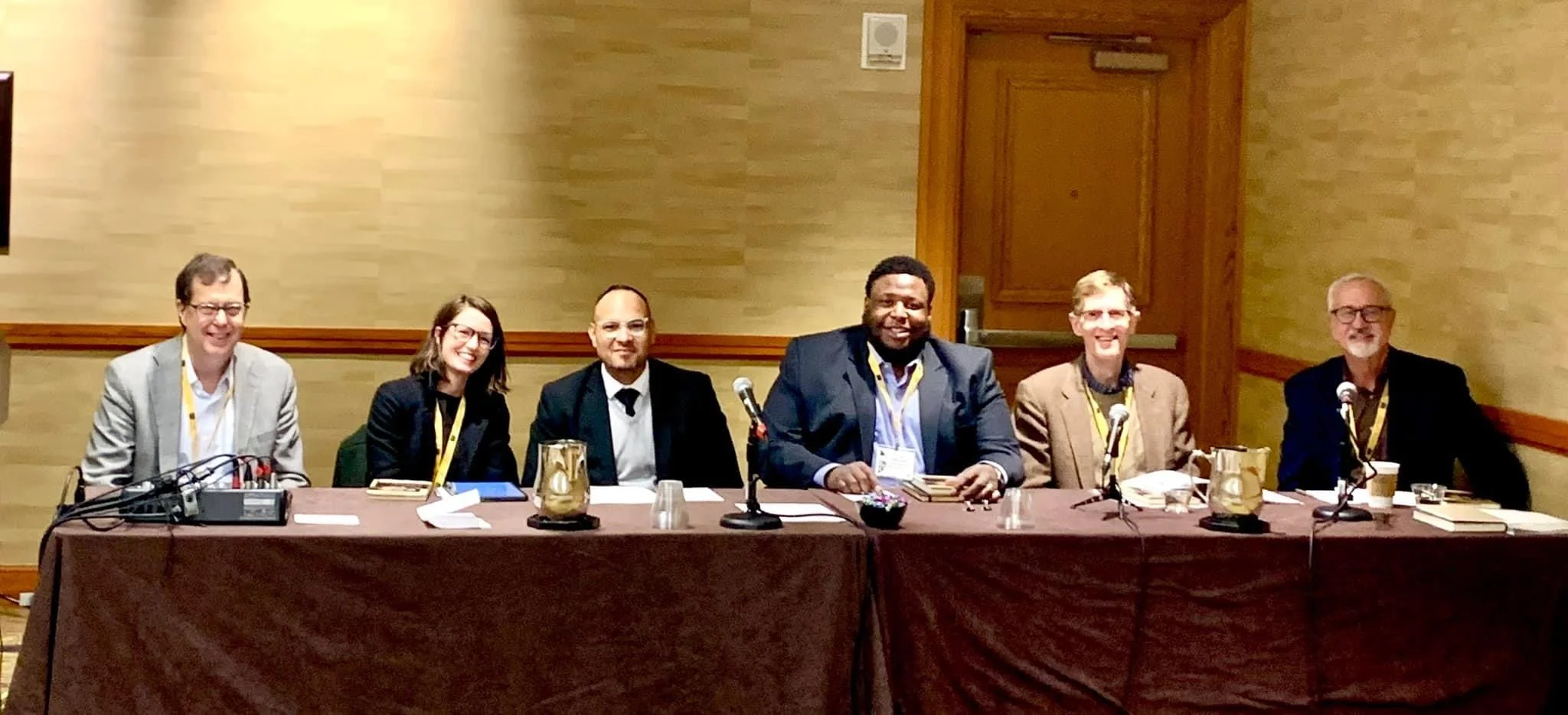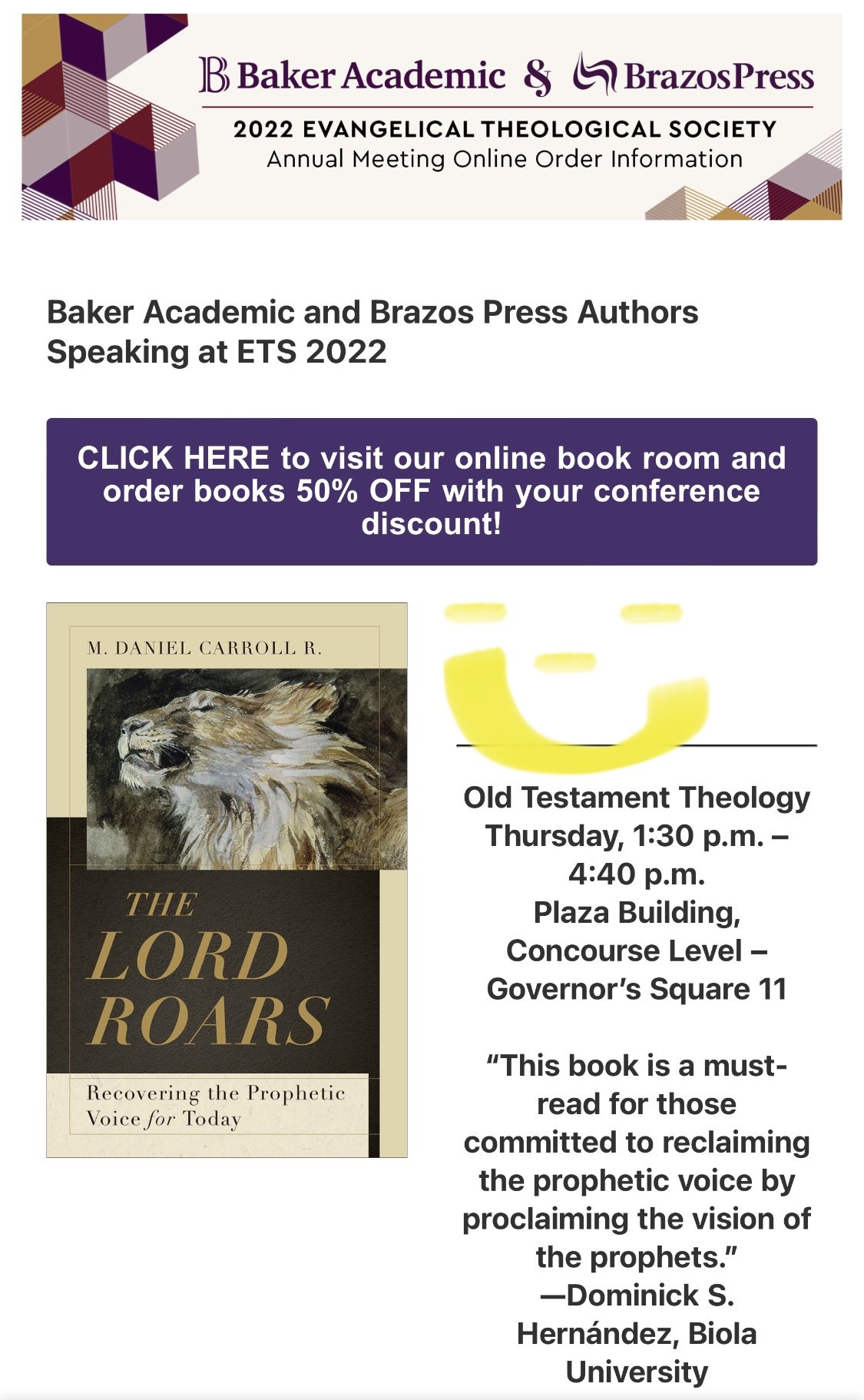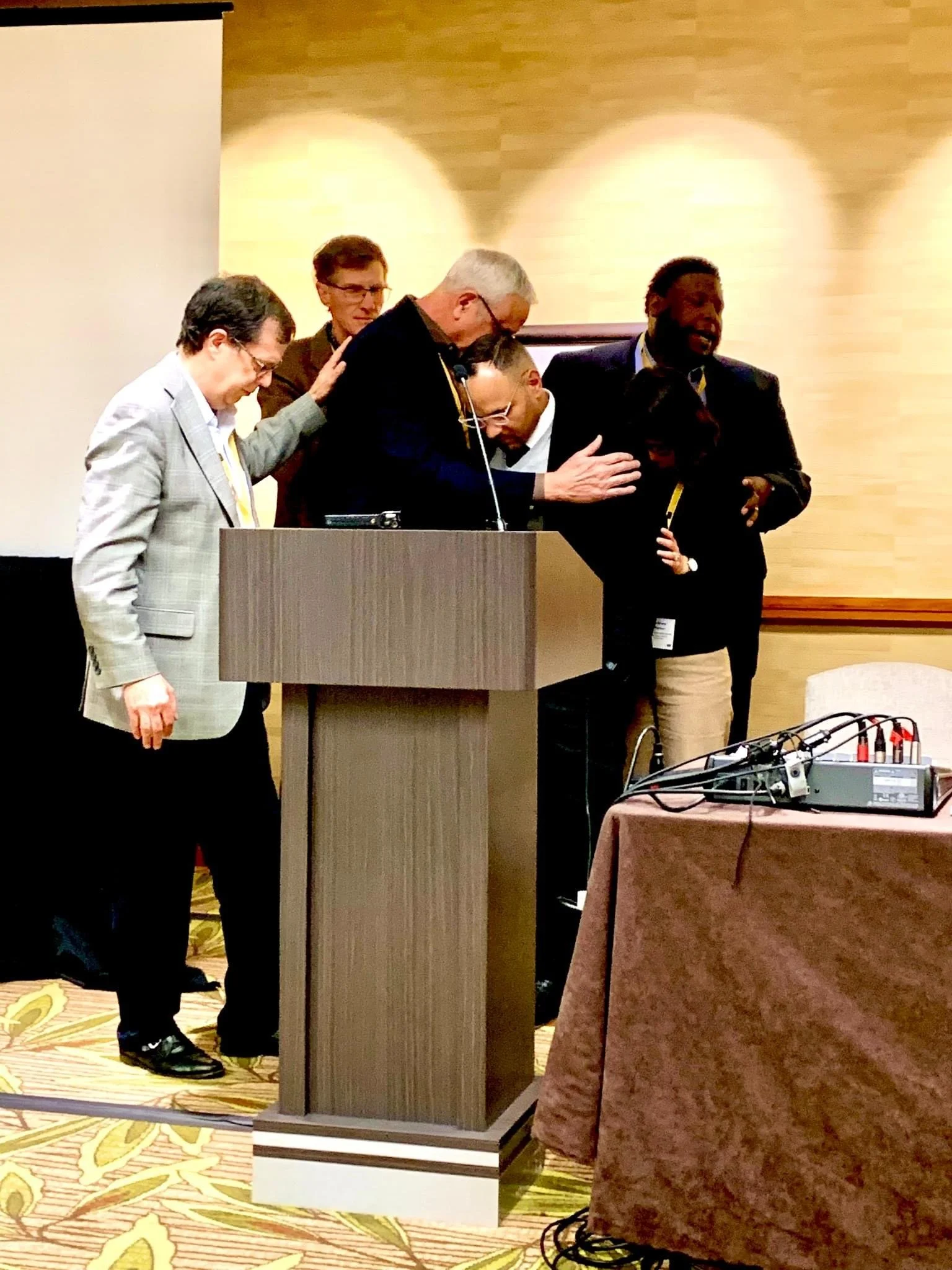Something remarkable happened on the final day of the Evangelical Theological Society Conference in Denver, CO (November 17, 2022). The final Old Testament Theology session transformed before our eyes from a standard forum to a thought-provoking discussion, to an emotional gathering, and ultimately ended in a prayer meeting.
Yes, you read correctly. In this session, Evangelical scholars simultaneously demonstrated the capacity to be thoughtful, passionate, sentimental, and spiritual, whilst being amicable with one another. An astonishing accomplishment!
Here is a bit more background to the session:
The Old Testament Theology Unit steering committee conducted a review session in which Professor M. Daniel Carroll R.’s book, The Lord Roars: Recovering the Prophetic Voice for Today, was evaluated by a diverse group of global scholars. This session turned out to be no ordinary book review session, which is typically characterized by presentations in which reviewers note a couple of good points in a given book, gently critique a few details, and end their addresses on a relatively positive note. That structure was doomed from the beginning because of the diversity of the panelists and attendees that were present in the room. Whereas some of the typical etiquette endured, all of the panelists related to Professor Carroll and his work from their own contexts, which afforded occasions for the reviewers to genuinely reflect upon how Professor Carroll’s book can be read by different communities. This created an atmosphere in which personal and, even, healthy emotional reflections ensued that are not typical to these types of gatherings. Being a Puerto Rican born in New York City uniquely affected how I approached the material, but also provided an opportunity for me to reflect upon my disposition toward Professor Carroll as a highly accomplished, Latino, Spanish-speaking scholar who resides in North America.
Upon returning home, I wanted post about this session so that it could forever be inscribed into the annals of sacred ETS history. Okay, well actually, I wanted to share my participation in this special event with those who would take the time to read. Also, I wanted to make sure that, by documenting my part of the discussion, I would never forget how special this session was, as well as the conversations, hugs, and prayers that ensued.
The blog entry below consists of my lecture given at the 2022 Evangelical Theological Society annual meeting, with some minor corrections and emendations.
The sessions’ participants from left to right: Mark J. Boda, Brittany Melton, Dominick Hernández, Brandon Washington, David Firth, M. Daniel Carroll R.
The Prophetic Voice of Professor Danny Carroll
May I begin with a moment of honesty?
It took me a really long time to write this paper…
Not because Professor Carroll’s book was an especially difficult read. On the contrary, we shall see through my remarks that it was a particularly delightful and engaging read. Rather, the impediment to my writing related to two distinct issues. First, I, like all professors at this point of the semester, have been particularly busy during this season.
But who cares?
All of us are busy right now, and we still write papers, irrespective of our busyness. However, if I had to pin down the main reason as to why this paper took me so long to write, even while I was staring at the computer screen, it was because of a deep sense of personal insecurity with regard to how I might be able to contribute to a review panel of Professor Carroll’s book, The Lord Roars.
I know. Scholars are not supposed to admit this type of thing. But hear me out for a second, please.
In 2008, I was a freshman at Princeton Theological Seminary when I wandered into the office of the Hispanic Theological Initiative (HTI). I had connected with the director of HTI, a Puerto Rican person with New York City roots like myself, and I sensed that this was a place where I could find the type of mentorship that I needed during my journey through seminary. The director of HTI perceived that Danny Carroll might be the type of person who could accompany me through this experience. Like me, Professor Carroll was an Evangelical, he had Latino roots, and he was a Spanish speaker. The HTI director provided me with Professor Carroll’s contact information, and I subsequently reached out to him.
Now, all of us have reached out to well-known professors. On many occasions, their response consists of crickets.
But professor Carroll was different. He responded, and his response was not like the emails of other professors who do not know the inquiring student. One could tell through the tenderhearted rhetoric of his emails that he was deeply invested in the person on the other end, whom he had yet to meet face-to-face. Professor Carroll continued to respond.
This might sound crazy, but this was the first time in my life that I—a Puerto Rican (Boricua), Spanish-speaking person living in the United States of America—had ever encountered a Hispanic/Latino professor of Old Testament with a terminal degree.[1]
And he responded to my emails!
So, why is the story of my becoming acquainted with Professor Carroll important to this book review? Let me explain.
Professors of Bible who teach hermeneutics generally tend to encourage their students to strive to admit, insofar as they are able, that the things they believe might affect their readings of texts as they engage with them. A responsible step in reading well is to admit those things that affect our hermeneutic toward the material with which we engage and to work through the material with those in mind. Even during this conference, I have heard Professor Carroll being affectionally called by other Latinos “nuestro abuelo” (our grandfather) and “nuestro padrino” (our godfather). Following the advice I give to my students of hermeneutics, I must admit that my relationship with Professor Carroll as an academic “abuelo” and “padrino” has heavily influenced how I read what he writes; how I listen to what he says. This is akin to how your relationship with your abuelo/a or your padrino/a would affect how you read anything this person would write or say.
I speak only for myself here, but it is reasonable to suggest that I represent a community of people upon whom Professor Carroll’s work has had a remarkable influence. We are Hispanic/Latino people who are striving to work through the unique challenges that we face as professionals in North America; people who are managing the distinct circumstances inherent in being brought to a new country or born in a country that may never feel like our home. It is difficult to be unbiased about Professor Carroll’s work, because his work is an inherent investment into our community. It is impractical to strive to approach Professor Carroll’s work impartially when he has already demonstrated deep compassion and care for our community. It is beyond one to consider Dr. Carroll’s work impartially when one is partial toward Professor Carroll as a person, as a professor, as a mentor, as an academic padrino, or abuelo.
As a result of this, I trust that you will forgive me for refraining from participating in the practices that are common to these types of review sessions. I have realized that my keenest observations about what Dr. Carroll has written in The Lord Roars, and my best contribution as a Latino American on this panel, are deeply rooted in the overlapping affinities that we share. For example, Professor Carroll mentions in the preface of The Lord Roars that the “nature of Christian mission in a context of violence and poverty drove [him] to the prophets for an orientation to those harsh realities of life.” Professor Carroll’s reflection on the prophets at least partially stemmed from his own experience of the “harsh realities of life”—particularly those that he observed during Guatemala’s decades-long civil war. The instability caused by war and poverty better represents the historical and political contexts in which sections of the biblical prophetic books may have been composed than do the affluence and comfort in which many contemporary North Americans read the prophets.
But not all who live in North America read the prophets while sipping $4 lattes. Violence and poverty are all too frequently experienced by many Latinos who live stateside. Again, my story intersects with Professor Carroll’s experience. I grew up as a Latino in a low-income housing sector. My father died when I was five (he was only 39 years old) leaving behind four children under the age of ten. We children were left as prey to those hardships that uniquely plague minority children who grow up without fathers. My mother, who had four children by the age of 26, never finished high school. Three members of my immediate family have spent significant time incarcerated. One of my best friends growing up was shot five times in a dispute related to drugs (he survived).
So, when Professor Carroll reflects on the prophets from a context of violence and poverty, our people listen. When Professor Carroll reflects on the prophets from a context of violence and poverty, I listen.
He has been there.
He gets us.
He has our respect.
Professor Carroll is right: “the biblical invective [of the prophets] was generated within gritty, unacceptable real-life settings.” This is why when I read Professor Carroll referencing a work entitled Tratado sobre las justas causas de la guerra contra los índios (Treaty on the Just Causes of the War against the Indians) or Visión de los vencidos: Relaciones indígenas de la Conquista (Vision of the Defeated: Indigenous Stories of Conquest), I cannot help but to reflect upon the irony that I, a Taíno[2] at least in part, am now a member of a people group that was compelled to learn Spanish and then English while perpetually referring to their homeland as “Borinquen” and their people “Boricuas,” by the Taíno names. When this Puerto Rican who currently resides in the United States of America reads footnotes referencing Los Conceptos fundamentales de la teología de la liberación (The Fundamental Concepts of Liberation Theology), I cannot help but to recall how the United States’ military inhabited the Puerto Rican island of Vieques for years while its inhabitants begged them to leave.
“Dr. Carroll brings the text to life; but bringing it to life means something a bit different for those who identify with the origins of the theological reflection.”
At this juncture, it might be the temptation of some to say, “Wait, what did you think about the content of the book?” What I am trying to say is that this shared experience is the content of the book in a way that is uniquely perceived by people like me, and it has an impact that transcends the cognitive domain. It hits the affect for me. It affects the psychomotor domain in that it encourages me to action. It helps me recognize, as Professor Carroll says, that “private piety is inseparable from public responsibility.” This is in the content. It is latent to the eyes that might not be looking for it, but it jumps off the page to those of us that have been starved of it. Dr. Carroll brings the text to life; but bringing it to life means something a bit different for those who identify with the origins of the theological reflection.
What’s the Book about?
Professor Carroll’s “desire to glean a relevant word from the prophets” is heeded by those who continue to look to the prophets in despair, striving to strain through their pain and poverty and hear the divine voice. Professor Carroll does not present a comprehensive account of Amos, Micah, and Isaiah, nor is the book overly technical; he does not want to confine the text to the academy. The ethical call to the believing community is too strong. Everyone must hear and respond to the powerful word from the prophets that remains applicable to all contemporary readers. In his words, he asks, “What might be a way forward toward utilizing the prophetic literature in our day? How can we make sense of its vision and appropriate these texts for our context?” Professor Carroll reminds us, “Responding to the text as a prophetic voice becomes an act of faithful obedience.”
To begin in chapter one, Professor Carroll alludes to the framework that Don Quijote de la Mancha presents that facilitates reading the prophets. Reading with Latino eyes, I immediately considered this to be a wonderful move for at least two inconspicuous reasons: 1) All Spanish speakers have heard of Don Quijote de la Mancha. But also, 2) most Spanish speakers that have heard of this book, do not understand it in its entirety. Naturally, Professor Carroll refers to the framework and principles of this high-level literature and makes that difficult text understandable and applicable. For example, the first few lines of Don Quijote read: “En un lugar de la Mancha, de cuyo nombre no quiero acordarme, no ha mucho tiempo que vivía un hidalgo de los de lanza en astillero, adarga antigua, rocín flaco y galgo corredor.” Spanish speakers do not tend to really talk like this, yet Professor Carroll finds a way to make Don Quijote relevant to all of his readers. Likewise, Bible readers have heard of the prophets. But they tend to be hard to understand, and thereby, perceived as inapplicable. However, as Professor Carroll expounds upon the prophetic books, which are replete with difficult sayings, their relevance promptly becomes evident. We perceive that the prophetic imagination helps “readers discover a relevant prophetic voice, one that is faithful to the biblical text and that arises from, for, and with our contexts to address contemporary matters.”
The prophetic imagination—specifically that of Amos, Isaiah, and Micah—is an alternate vision of reality. As professor Carroll states, “It reorients the various dimensions of human social life and provides a lens to apprehend sociopolitical and economic reality as it is in God’s sight.” By making observations through this lens, even contemporary readers are able to see and apply the principles of the prophets and view the realities of that which “lies at the heart of much cultural, sociopolitical, and economic sin.” In short, according to Professor Carroll, the main sin is hubris. All believers in the God of Israel must hate the type of pride and arrogance that leads to personal, political, and nationalistic haughtiness.
Professor Carroll notes that “the prophetic imagination (and the entire Old Testament) has an expansive appreciation of sin, which can help us recognize how pervasive and cruel it is and that it is individual, social, cultural, structural, national, and international.” Few specific transgressors “are named by the prophets but instead are identified by their actions.” This prophetic vagueness permits contemporary readers to make analogies quite easily and apply the principles in the text to the modern age. Seeing the same type of hubris in our world drives contemporary readers and believers in the God of Israel to a righteous anger of sorts. As Professor Carroll asserts, “The prophetic imagination is a disturbed one, one upset at injustice. But this is a theologically informed anger.” Therefore, while seeking justice, a healthy question to perpetually ask is, “What ultimately drives our prophetic passion?” If we are dedicated to employing the prophetic imagination, we will not only find ways to battle hubris in our 21st-century companions, but we will also strive to be humble ourselves. As we call out issues of injustice, we will always leave space for repentance while simultaneously declaring the judgment of God so that denunciation of sin does not simply become a loud protest of unfairness.
Perhaps the most moving and timely section of Professor Carroll’s book is chapter three, which focuses on the denunciation of Israel and Judah’s worship. Here Professor Carroll surveys multiple situations in a variety of contexts in which the church has aligned itself with governments for unjust means. Needless to say, the blending of faith and political ideology has been disastrous throughout history. But this is not simply relevant in contemporary history. Professor Carroll demonstrates through surveys of Amos, Micah, and Isaiah that Israel also combined religion, ideology, and culture, which ended up being disastrous for them. At the bottom of this disaster was, lo and behold, a misconstrued “faith” that developed as a result of the people’s mistaken view of God.
The analogy is clear:
When contemporary students of the Bible combine religion, ideology, and culture in order to utilize this unholy trinity for personal means, we are not worshiping the one true God. We are worshipping another god. Carroll states, “Bifurcating Yahweh from morality and manipulating worship for political ends or ignoring social ills reveals that it is not Yahweh whom they worship.” Not to be dramatic, but this chapter provokes modern readers of the prophets to consider whether their religious world is a complex lie sustained by religious practices and institutions that have been fabricated by melding religion, ideology, and culture. Are we really worshipping the God of Israel in our churches, or like Israel and Judah, are we lying to ourselves?
“Carroll’s book is an invaluable, biblically faithful resource for Christians who wish to embody a contemporary prophetic voice to push back against the ethical failures of the Christian church, speak out against injustice, and confront oppressive authorities and structures. ”
But the prophets also provide hope—eschatological hope. By embracing the prophetic worldview, contemporary readers imagine a future world order in which injustices will be removed and replaced with God’s systems of “plenty, justice, and peace.” God’s plenty, justice, and peace mirror the three features of Israel and Judah that the prophets condemn: socioeconomic oppression, corrupt and callous leadership, and deplorable worship.” Our eschatological “hope [is] to be taken to heart and lived out in society and in history.” The people of God are not only promised a splendid future in which injustice will not continue, but also, a future in which injustice cannot continue.
Professor Carroll’s book is yet another instance in which he demonstrates that global voices do not simply help people better understand the Bible; they are necessary to developing holistic perspectives on what the Bible teaches in certain passages, especially for their broad application in our day and age. In the case of The Lord Roars, global scholars who have experienced the type of instability that may have been akin to the fickle environment surrounding the prophetic event are crucial to bringing the text to life. Many global voices have experienced this type of turmoil more so than commentators who are familiar only with the North American experience. We thank Professor Carroll for referencing global scholars not only from Latin America—though we are diverse in culture and even language among ourselves—but also other places, such as the Democratic Republic of Congo and South Africa, to name a few.
A snippet of my endorsement. The full endorsement can be found here.
I had the privilege of endorsing The Lord Roars, meaning that I read the book several months ago and wrote a highly favorable endorsement. I must say that after reading it a second time, I love it now. This is surely influenced by my admissions in the introduction to this paper. Yet also, Professor Carroll’s work is even more applicable as it is read over and over again, just like the prophets. This means that if I had to make a couple of suggestions in order to continue the discussions started in the book, I would recommend another volume focusing on how the other prophets uniquely contribute to this conversation. I would also love to see a workbook that could help people doing small group Bible studies go through The Lord Roars and practically apply the principles that Professor Carroll teaches in the book. Many times, while reading, I found myself agreeing with Professor Carroll in principle just to also find myself wondering, “Okay, how do I apply this in my context?” A workbook that answers the question “What now?” would help readers contextualize the principles of this book in their personal circumstances and in their communities, and would most certainly be helpful in encouraging people to action.
Professor Danny Carroll – A Prophetic Voice for Today
As I read The Lord Roars, I could not help but to think about how aspects of the book represented what I know of Professor Danny Carroll. For example, even Professor Carroll’s choice of Cervantes’ Don Quijote de la Mancha, and Dickens’ A Christmas Carol as frameworks proposed in chapter one demonstrates that he is a highly educated, multicultural, English- and Spanish-speaking person.
Additionally, Professor Carroll really comes down on the issue of hubris in chapters 3-4 by pointing out the extensive Biblical Hebrew vocabulary that relates to this issue. Professor Carroll is the right type of person to push his readers to check themselves on this issue. How many of us have been touched by Professor Carroll’s humility? Have we not seen and experienced Professor Carroll’s “preferential option for the vulnerable” lived out, both in the academy by pushing for his students and advocating for good professional placement for junior scholars, and in his public and ministerial lives? Professor Carroll has exemplified not using personal status to manipulate situations in order to prey on the vulnerable, which is an epidemic that plagues academia. In a profession in which things may have gone even better for Professor Carroll if he was quieter, he has lived his personal and vocational lives pointing to the biblical truths that make people uncomfortable as way to protect the vulnerable. Professor Carroll has spoken out against those who would overlook the poor as well as those who would overlook the wrath of God. His prophetic voice has been an honest voice; it has been a voice that has communicated the divine word to those with an ear to hear.
This book is appropriately written by Professor Danny Carroll, one of the primary prophetic voices within the global church today. When Danny Carroll speaks, he speaks directly to the hearts of people like me. We confirm the contemporary prophetic voice of Professor Carroll that calls us to action while calling out those who might falsely parade the prophetic mantle, instructing them to put it down and put on the image of Christ, the ultimate Servant.
